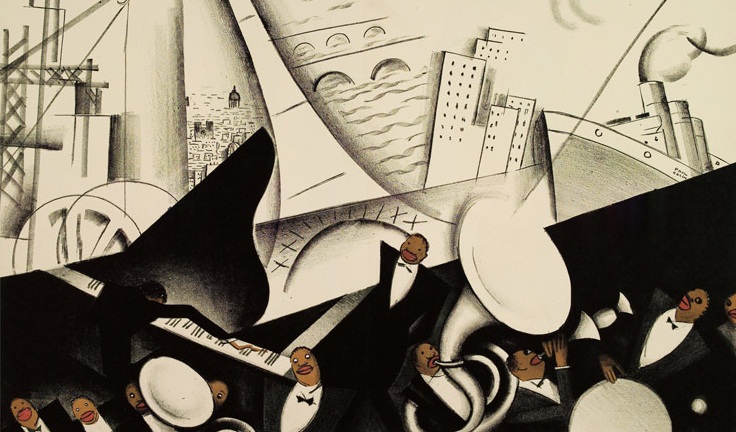
26/07/2013, by CLAS
Jazz in France
In a poem written in the 1930s, Léopold Sédar Senghor, a black student from French West Africa, soon to be recognised as a founding father of the négritude movement, recounts strolling down the Rue Fontaine in Paris, past the open door of the Cabane cubaine, an early jazz club. As the sounds of jazz spill out onto the street, Senghor is suddenly put back in touch with the West African homeland that he has left behind in order to come and complete his studies in the imperial metropolis. Jazz reminds him both of his African home and of his black brothers in the USA, awakening him from his Parisian slumber and readying him for what he figures as a transnational struggle in defence of black identity and dignity.
At about the same time, in New York, Fortunat Strowski, a white Frenchman, Professor of French Literature at Columbia University, was also feeling homesick. His solution was to go to a jazz club because, he claimed, the music reminded him of his distant French homeland. According to Strowski, it was clear for all to see that jazz was originally a French form of music, born in the French Quarter of New Orleans, a city itself founded by the French. If jazz tended to be played by African Americans, this merely reflected the fact that these were the descendants of French-owned slaves from the formerly French colony of Louisiana who had learned jazz by overhearing the folk songs and quadrilles played by their French masters. The jazz critic André Coeuroy would later cite Strowski’s interwar experiences at the opening of his 1942 study Histoire générale du jazz, before going on to argue that, as an essentially French form of folk music, jazz should play a central role in the Vichy regime’s reactionary programme of national regeneration.
Two homesick French-speaking intellectuals, one black one white, both seeking solace in the sounds of a music that, they claimed, gave expression to their particular national or ethnic identity. Two French-speaking intellectuals who laid claim to jazz by drawing on diametrically opposed understandings of the music’s origins, genesis, and hence significance. Yet, despite those obvious differences, these competing interpretations of jazz both appealed to a longer history of French involvement in the slave trade and in imperial expansion and conquest, in sub-Saharan Africa and the New World.
These are just two of the French responses to jazz that Jeremy Lane, Associate Professor in the Department of French & Francophone Studies, examines in his new book, Jazz and Machine-Age Imperialism: music, “race”, and intellectuals in France 1918-1945 (University of Michigan Press, 2013). The book focuses on two distinct corpuses of writing on jazz. The first is composed of the first four book-length studies of jazz written by white French jazz critics, by André Schaeffner, Robert Goffin, Hugues Panassié, and André Coeuroy, respectively. The second corpus comprises the diverse responses to jazz penned by a selection of French-speaking intellectuals of colour, who had come to Paris in the interwar years to complete their studies. This corpus includes the early poems and essays of the Nardal sisters and René Menil (from Martinique), of Léon Gontran Damas (from French Guiana) and Léopold Sédar Senghor (from French West Africa). The book examines the variety of ways in which all of these French-speaking intellectuals responded to the jazz they first encountered in these years, showing how such responses were bound up with a series of broader concerns about French imperialism and anti-imperialism, the changing status of women, the terrible destruction of the First World War, the challenges to received notions of French identity and cultural superiority posed by the rising power of machine-age America, by the first stirrings of revolt in the French Empire, and by the discovery of the apparently more authentic, dynamic forms of ‘primitive’ black culture and music.
No comments yet, fill out a comment to be the first

Leave a Reply